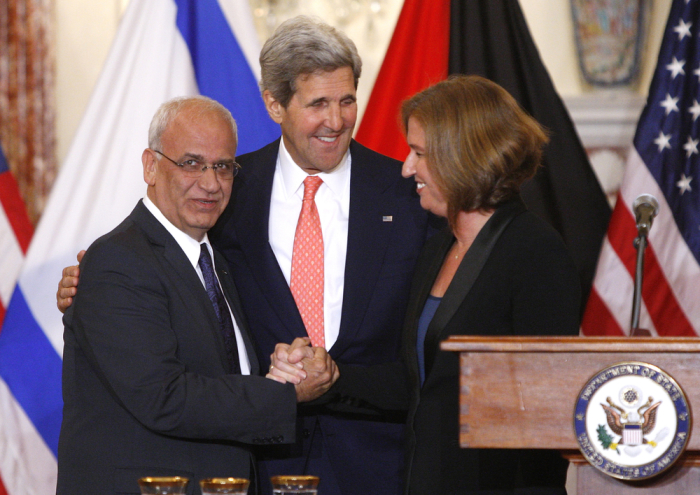Israel, Palestine Agree to Commence Formal Middle East Peace Negotiations
All 'final status issues' will be up for discussion, without preconditions, U.S. Secretary of State John Kerry announced Tuesday
Following an informal Iftar dinner at the Department of State in Washington, D.C. on Monday, U.S. Secretary of State John Kerry announced Tuesday that the initial meetings between Palestine and Israel have been successful, and both have agreed to commence formal peace talks within the next two weeks.

Kerry announced at the Department of State's Benjamin Franklin Room on Tuesday that the upcoming formal peace talks serve as a "new moment of possibility" for Palestine and Israel.
"The time has come for a lasting peace," Kerry said Tuesday.
Kerry added that all so-called "final status issues" - such as borders, the status of Jerusalem, and the right of return for Palestinian refugees - will be on the table, and that there would be no preconditions on any of those hot button topics. The goal, he said, is to reach a "final-status" agreement within nine months.
Negotiators from both Palestine and Israel gathered at the State Department on Monday and Tuesday for initial meetings, including an Iftar dinner, to test the waters for formal peace talks and to discuss the criteria they would be founded on.
The negotiators gathered Monday evening to observe Iftar - the Muslim gathering to break the daytime fast of Ramadan. The dinner was seen as strictly observatory, and avoided tense issues such as borders and security; both of which will be discussed in great detail over the coming weeks.
While Kerry, who brokered the peace talks, met with each negotiating team individually before the dinner on Monday, the negotiators and representatives from both Israel and Palestine gathered around the table to begin the meal. Sitting on one side of the table was Kerry, as well as a delegation of four from the U.S. Department of State, including Martin Sean Indyk, the U.S. Special Envoy for Israeli-Palestinian Negotiations.
Seated at the other side of the table was Israeli Justice Minister and chief negotiator Tzipi Livni, Palestinian chief negotiator Saeb Erekat, and Yitzhak Molcho, an adviser to Israeli Prime Minister Benjamin Netanyahu.
Kerry reportedly sought to keep things light at Monday's gathering, telling his guests: "It's very, very special to be here."
"There isn't very much to talk about at all," he joked, according to The Telegraph.
Reports indicate that both Palestine and Israel had initially disagreed on the structure of the talks. Previously, the two areas had agreed to take on easier issues and move towards the more contentious ones, but this time, an Israeli official announced on the country's radio program that all issues would be discussed simultaneously, while a Palestinian official argued that the talks would begin with issues of border and security.
Kerry acknowledged on Monday that the talks would not be easy, and he added that he is expecting "reasonable compromises" between the two territories.
"It is no secret this is a difficult process. If it were easy, it would have happened a long time ago," Kerry told reporters on Monday prior to the dinner. "Many difficult choices lie ahead for the negotiators and for the leaders as we seek reasonable compromises on tough, complicated, emotional, and symbolic issues."
The peace talks between Israel and Palestine came to a halt in 2010 when tensions regarding territory expansion reached a boiling point. The goal of Palestine in the talks is to agree with Israel on definitive boundaries for their state, which loosely expand from the West Bank to East Jerusalem, and to the Gaza Strip.
Plans for the talks became a reality when Israel agreed to release 104 Palestinian prisoners being held in Israeli jails for deadly attacks. The prisoners will be released in stages over the next nine months, and their release is reportedly dependent on the progress made in the talks.
U.S. President Barack Obama and Vice President Joe Biden attended the informal talks on Tuesday, meeting privately with negotiators from both Palestine and Israel at the White House, although no further news of this meeting has been revealed.





























